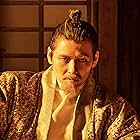IMDb RATING
7.4/10
5.4K
YOUR RATING
An exploration of the warring kingdoms of feudal Japan when several powerful warlords fought to become absolute ruler.An exploration of the warring kingdoms of feudal Japan when several powerful warlords fought to become absolute ruler.An exploration of the warring kingdoms of feudal Japan when several powerful warlords fought to become absolute ruler.
- Awards
- 1 win & 2 nominations
Browse episodes
Storyline
Featured review
All Japanese history is new to me so everything exposed sounds truthful, as a starting point it was an interesting show and a more dramatic approach, mainly focused on iconic people and their motivations. Context and culture are underdeveloped in my opinion and just linked to war and conquests. It doesn't go deep on samurais persona. It could be any other soldier executing the same wars and it would be irrelevant to the show. When they faced japanese an chinese armies it felt the same, they were just more experienced warriors.
Considering there are big differences in the strategic approach of some japanese clan leaders it also doesn't go deep on why they took their approaches. It is reduced to something like "there is an opportunity to take control, i want to take control to be the lord of Japan". I think one of the things that make the show feel flat is that, the motivation is kind of always the same, and even when there is a more stable approach, it doesn't explain how that specific warlord came up with his view and his strategies. There's a few times where education is mentioned but not a lot on what are their principles or logic. In the China's invation campaign, some other great warlords/emperors of other continents were mentioned, but not if the japanese warlords had some prior knowledge about their history or if they were some motivated by them. It was an open reference, and the only concrete one was that China was always a big goal. So i would say the show is a review of wars and control shifts monstly in the XVI century. The biggest principle to feel connected to the characters is the general sence of constant war, as a defensive nature, so they eat to not be eaten. It might be that way, so that is not something i consider so much to base this rewiew.
I enjoyed the show mostly (as a war documentary I think), however I didn't like how many times battles, decisions or anything important is stated as the "ultimate", "greatest", "biggest" and a lot of other flashy words. At some point we started joking about this with my wife because we actually got confused, to the point we couldn't compare turning points or battles. Is not a history class but as an informative piece it kind of takes away the importance of some historical moments trying to expose everything as epic.
Considering there are big differences in the strategic approach of some japanese clan leaders it also doesn't go deep on why they took their approaches. It is reduced to something like "there is an opportunity to take control, i want to take control to be the lord of Japan". I think one of the things that make the show feel flat is that, the motivation is kind of always the same, and even when there is a more stable approach, it doesn't explain how that specific warlord came up with his view and his strategies. There's a few times where education is mentioned but not a lot on what are their principles or logic. In the China's invation campaign, some other great warlords/emperors of other continents were mentioned, but not if the japanese warlords had some prior knowledge about their history or if they were some motivated by them. It was an open reference, and the only concrete one was that China was always a big goal. So i would say the show is a review of wars and control shifts monstly in the XVI century. The biggest principle to feel connected to the characters is the general sence of constant war, as a defensive nature, so they eat to not be eaten. It might be that way, so that is not something i consider so much to base this rewiew.
I enjoyed the show mostly (as a war documentary I think), however I didn't like how many times battles, decisions or anything important is stated as the "ultimate", "greatest", "biggest" and a lot of other flashy words. At some point we started joking about this with my wife because we actually got confused, to the point we couldn't compare turning points or battles. Is not a history class but as an informative piece it kind of takes away the importance of some historical moments trying to expose everything as epic.
- martinmelladog
- Feb 28, 2021
- Permalink
Details
- Release date
- Country of origin
- Official site
- Languages
- Also known as
- La Edad de Oro de los samuráis
- Production companies
- See more company credits at IMDbPro
- Runtime44 minutes
- Color
Contribute to this page
Suggest an edit or add missing content

Top Gap
What was the official certification given to Age of Samurai: Battle for Japan (2021) in Canada?
Answer












